Iran-backed Houthis attack another Greek-operated vessel in Red Sea
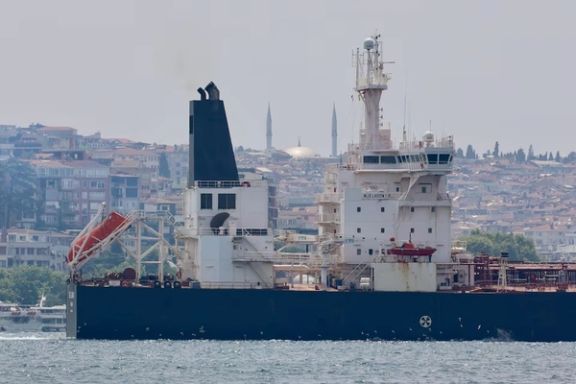
The Iran-backed Houthis in Yemen targeted a crude oil tanker in the Red Sea amidst its blockade targeting global shipping, with a Greek-operated vessel struck in the latest attack.

The Iran-backed Houthis in Yemen targeted a crude oil tanker in the Red Sea amidst its blockade targeting global shipping, with a Greek-operated vessel struck in the latest attack.
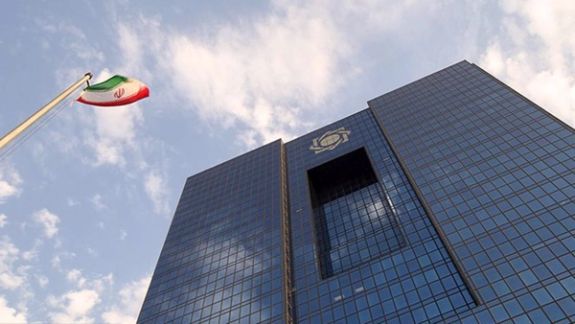
Iran's Central Bank Governor has been summoned by Parliament after reports surfaced of major loans being granted by the country's banks to their own employees and subsidiaries.
Earlier, in response to growing criticism over these loans, the Central Bank released a report on August 30, stating that the total loans provided by banks and credit institutions to their employees, managers, and board members in 2023 amounted to more than 9,100 trillion rials (over $1.5 billion).
Despite this amount of bank loans to their employees and subsidiaries, the Central Bank said that "reviews indicate that, given the issuance of the Central Bank's directives and regulations in this regard, these loans are under controlled management."
Two of the country's most influential banks, Mellat and Sepah Bank, issued the highest volume of loans, providing 190 trillion rials (over $315 million) and 145 trillion rials (over $240 million), respectively, to their subsidiaries last year.
Both banks are notorious for their controversial roles in Tehran’s political and financial arenas, having been accused of supporting military and nuclear programs—activities that have resulted in severe international sanctions. In the face of these sanctions and economic hardships, they have been propped up and kept afloat by Iran's Central Bank.
In reaction to news of the large loans to bank employees and subsidiaries, domestic media have highlighted the significant challenges ordinary citizens face securing loans for housing, marriage, entrepreneurship, and private sector ventures.
State media Khabar Online reported that the loans granted by banks to their employees and subsidiaries are nearly equivalent to the total amount needed for marriage loans for 300,000 people who have been waiting for months with no response from the Central Bank.
On Sunday, semi-official ILNA news agency reported that Jafar Ghaderi, a member of the parliament, mentioned the "distribution of astronomical loans" among bank employees and the "unequal access to loans among the public." He stated that the Governor of the Central Bank and several bank CEOs would be summoned to parliament to provide explanations on this matter.
The report highlights a stark disparity in loan ceilings between different groups. For some bank employees, the loan limit exceeds 10 billion rials (over $16,000), while retirees have a maximum loan limit of only 300 million rials ($500), which is less than what a bank teller earns in a month.
In contrast, tenants seeking rental deposit loans and couples looking for marriage loans face long waiting lists, with the banking system attributing these delays to a lack of financial resources.
Meanwhile, the latest July report from the Codal system indicates that the accumulated losses of Iran's banking system amount to 3,700 trillion rials (over $6 billion).
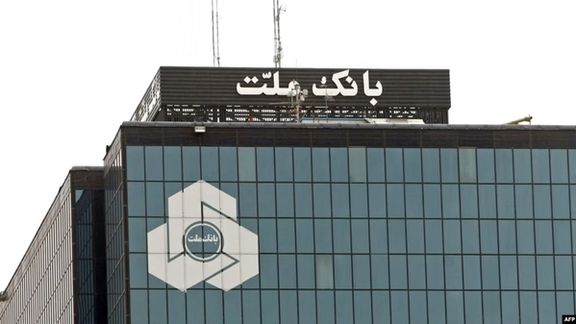
According to a report by Eco Iran on July 10, "the accumulated losses of the country's banking system have exceeded $6 billion, which is more than half of the projected oil revenues for this fiscal year (starting March 21). In other words, addressing the banks' accumulated losses would require at least 50 percent of this year's oil revenues."
The highest recorded accumulated loss belongs to Ayandeh Bank, which has exceeded 1,140 trillion rials nearly ($2 billion).
The latest figures from the Codal system suggest that Melli Bank had an accumulated loss of more than 760 trillion rials (over $1.2 billion) by the end of September last year, ranking second.
Other banks with significant accumulated losses include Sarmayeh, Sepah, Iran Zamin, Shahr, Dey, Keshavarzi, Maskan, Melal Credit Institution, Parsian, Tosee Taavon Bank, and Taavon.

The head of a major trade association for large-scale builders in Iran is blasting sanctions for blocking the country's entry into Iraq's housing market, urging the two governments to come up with a solution.
Blaming sanctions for restricting financial transactions and complicating the issuance of guarantees needed for contracts and tenders, Iraj Rahbar of the Mass Housing Builders Association told the semi-official ILNA news agency that these hurdles are why Iranian companies struggle to enter the Iraqi market.
"One of our problems is the issuance of guarantees, which we need for participating in tenders, and the maximum period for this is 10 days. However, we are not able to do this within this time frame, and even if a guarantee is issued, Iraq does not accept it," Rahbar said in the interview.
The head of the trade association admitted that the issue is not limited to Iraq, as other countries also do not accept Iranian guarantees.
Tehran faces sanctions primarily due to concerns over its advancing nuclear program, ballistic missile development, support for regional armed terrorist groups, and domestic human rights violations. These actions are seen by the U.S. and its allies as threats to regional stability and global security.
Iran is already a key player in Iraq's housing sector, as emphasized by Bahman Abdollahi, head of Iran’s Chamber of Cooperatives, and Osama Abdul-Redha Saad, a member of the Basra Council in Iraq.
In a recent meeting between the two, Abdollahi proposed constructing 150,000 housing units in Iraq, expressing readiness to supply materials, construction services, and consumer goods to support this initiative. Saad, in turn, implied that further collaboration between Iran and Iraq in the construction sector would be a logical step that could enhance both countries' interests.
Rahbar similarly said Iranian companies are fully equipped to handle housing projects in Iraq and have no technical hurdles, emphasizing that they have long been prepared and willing to enter the Iraqi market. Alluding to Iran’s unsuccessful attempts to break into Syria's construction market despite Tehran's readiness and efforts, Rahbar said that despite cooperation protocols being signed, “the Syrians did not commit to it and eventually were not willing to cooperate with Iran and Iranian companies, showing no interest."
"Given that we share a border with Iraq, commuting for project execution and the export of engineering services would be easier. However, we face challenges in exporting engineering services to Iraq," Rahbar said.
Rahbar noted that Iran previously relied on the Islamic Development Bank for financial guarantees and transfers with Iraq, leveraging its status as a major shareholder. However, he pointed out that this avenue of support is no longer available, likely due to the escalating effects of sanctions.
Over the past year, Iran's accelerated nuclear enrichment, ballistic missile development, support for proxy groups like Hezbollah, crackdown on domestic protests, supply of drones to Russia, cyberattacks, and its strikes on Israel have only deepened tensions with the West, making the removal of existing sanctions unlikely.
To overcome these challenges, Rahbar called on the governments of Iran and Iraq to establish specific agreements or frameworks to facilitate smoother economic cooperation and mitigate the effects of sanctions on their bilateral trade and business activities.
"The governments of Iran and Iraq must make solid agreements on this matter and provide mutual assurances for these agreements so that Iranian companies can enter the Iraqi market without risk or with reduced risk," he said.

As newly elected President Masoud Pezeshkian formed his cabinet, the country’s Supreme Leader—widely recognized as the ultimate authority in Iran—made a vain effort to appear detached from the selection process.
"Mr. President also consulted with me, and I endorsed some of the individuals I was familiar with or whose competence was conveyed to us through reliable sources. I emphasized that certain individuals should definitely be in the cabinet, while for many others, I simply stated that I had no opinion," Ali Khamenei said after the selection process concluded.
On the other hand, Pezeshkian, in an effort to defend his ministerial choices, emphasized his coordination with Khamenei. As a result, the parliament voted in favor of all the proposed ministers, despite the fact that just the day before, the largest faction in the parliament—representing more than two-thirds of the votes—had announced it would not support four of the nominees.
"The Islamic Guidance Minister initially did not want to join; Sir [Khamenei] ordered him, and he came along. I don't want to say these things; why are you forcing me to? I don’t want to go into details, but I want to say that I coordinated [with Khamenei] before coming here. Sir [Khamenei] himself said that Mrs. Sadeq should be in the cabinet. All these esteemed individuals have joined with coordination and understanding," Pezeshkian said.
Two key questions arise, which can help clarify the process and structure of ministerial selection in the Islamic government: What are the legal and actual roles of the Islamic Republic’s Leader in choosing ministers? How does this role influence the selection process, and what are its consequences?
Extralegal interference
Iran's Guardian Jurist, known as the "Vali-ye Faqih" or "Supreme Leader," is the highest authority in the Islamic Republic of Iran. To understand the role of the Guardian Jurist in selecting ministers, examining the Constitution alone is insufficient. According to the Constitution, the president nominates ministers, and the parliament approves or rejects them.
However, in practice, real political power lies with the Guardian Jurist, whose authority is absolute, unrestrained, and unaccountable. If he does not approve of a ministerial candidate and that candidate is still introduced, he can create three specific political challenges in the face of that decision.
First, the Guardian Jurist or his office would signal to parliament members not to vote for the candidate. If they defy this signal, the Guardian Council could disqualify them from the next election or initiate a criminal case against them.
Second, the Guardian Jurist could employ parallel security agencies, such as the IRGC intelligence, to undermine the candidate or damage their reputation.
Lastly, he could interfere with or disrupt the candidate’s ability to perform their duties effectively.
During Akbar Hashemi Rafsanjani's first term as president in the early 1990s, Khamenei's influence over the cabinet was relatively limited, as he was still in the early years of his role as Supreme Leader following the death of Ruhollah Khomeini, who had wielded considerable power. However, by Rafsanjani's second term, Khamenei had begun to consolidate his authority and exerted more influence over the selection of key ministers, including those for Foreign Affairs, Intelligence, Islamic Guidance, and Defense.
Under Mohammad Khatami's administration (1997-2005), Khamenei, along with the institutions under his control, took steps to ensure that key ministries—such as Foreign Affairs, Justice, Intelligence, Islamic Guidance, and Defense—remained under their influence. After a series of assassinations of dissidents and writers by Intelligence Ministry agents, Khatami succeeded in appointing his own choice for the Intelligence Ministry. However, when it came to the Ministry of Interior, Khamenei intervened by directing the Majles (parliament) to impeach Khatami’s preferred candidate and install his own choice instead.
In Mahmoud Ahmadinejad's first term as president (2005-2009), he and Khamenei maintained a harmonious relationship with little to no tension. During his second term, however, a significant rift emerged between them over the appointment of the Minister of Intelligence, Haydar Moslehi. In protest of Khamenei's decision, Ahmadinejad refused to attend work for 11 days, but ultimately, Khamenei's choice prevailed. This rift persisted for the remainder of Ahmadinejad’s presidency.
Hassan Rouhani secured his position by accepting Khamenei's vetoes and influence over the selection of ministers, which helped maintain a tension-free relationship. In contrast, Ebrahim Raisi was so closely aligned with Khamenei that his ministerial choices naturally reflected the Supreme Leader's preferences. This level of coordination was so strong that Khamenei even instructed Pezeshkian to ensure that his cabinet continued to follow the path set by Raisi.
Through this approach, Khamenei has gradually taken over the power to veto or impose cabinet members on the president without being accountable for their performance. Previous presidents often concealed this reality to avoid embarrassment and conflict with Khamenei.
Pezeshkian openly exposing Khamenei's interference in the ministerial selection process, has sparked resentment among some of Khamenei's loyalists in media outlets like Kayhan Daily.
The President typically expects three things from his ministers: loyalty to him, alignment with parliamentary expectations (to avoid impeachment), and enough public support to secure votes for him and his political coalition.
In contrast, Khamenei demands only loyalty and obedience. His involvement in selecting ministers thus ensures his absolute authority, channels resources into his economic interests, and guarantees the strict implementation of his policies.
Implications of the selection process
In Iran, the selection process for high-ranking officials often leads to the appointment of individuals with certain common traits. These individuals often lack a specific policy plan and are prepared to make promises to stay in power. They are typically adept at pleasing those in power and skilled in hiding corruption and inefficiencies within the government.
Despite claims of prioritizing merit and expertise in the selection of ministers, the level of government expertise in Iran has thus steadily declined, and the principle of meritocracy has been disregarded.
Competent individuals never attain high-level positions such as ministers or members of parliament. When experts are appointed to lower-level roles, they are often dismissed swiftly.
In one rare example, Kaveh Madani, a distinguished environmental expert and former deputy of the Environmental Protection Organization, was removed from his position quickly despite his expertise.
Political cliques and entrenched factions are determined to uphold the influence of those who further their interests and reinforce their own power. As a result, inefficiency, lack of transparency, and corruption have increased, leading to a growing erosion of public trust in the state.
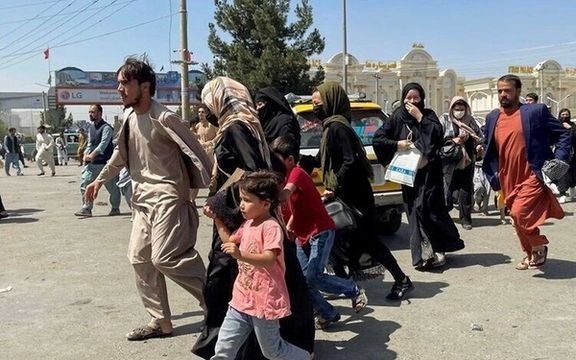
Concerns are mounting in Iran over the increasing number of Afghan migrants, particularly since 2023, when reports emerged that the interior minister and IRGC general Ahmad Vahidi, was encouraging the influx of Afghans into the country.
The move was reportedly part of a strategy to present Afghan refugees as Iranian citizens who would vote in the 2024 parliamentary elections and support the anticipated re-election bid of former President Ebrahim Raisi in 2025. Since 2020, Iranians have increasingly resisted participating in elections, which are widely perceived as biased and unfair, favoring hardline factions, including the ultraconservative Paydari Party.
During the past weeks, numerous reports in the Iranian press and social media posts have accused Afghan immigrants of being unwelcome elements exacerbating the country's already strained employment, health, and education sectors.
Iran has been grappling with a severe economic crisis since 2018, following the United States' withdrawal from the JCPOA nuclear deal and the subsequent imposition of sanctions. The inefficient, government-controlled economy has struggled to manage the fallout, with inflation soaring above 40 percent.
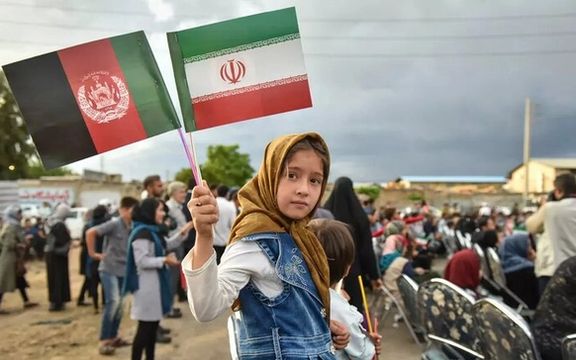
Public infrastructure, already weakened by years of inadequate investment, is buckling under the pressure. School buildings are crumbling, and teachers earn as little as $250 per month. This summer, a severe power shortage gripped the country, leaving industries idle and homes enduring prolonged blackouts.
Amid these dire conditions, many Iranians argue that the country is simply not in a position to accommodate additional migrants. They accuse the government of negligence in failing to stem the influx of Afghan refugees, which, according to some estimates, has added 8 million people to the population—roughly 10 percent of Iran's total.
However, following the election of President Massoud Pezeshkian, some recent reports have sought to ease societal tensions in Iran. One of the latest reports argued that hostility towards Afghan immigrants is, in fact, an anti-Iranian stance. The report contended that the campaign against the presence of Afghans in Iran represents a form of hostile nationalism that fosters irrational xenophobia.
Meanwhile, other reports have revealed that contractors associated with the Tehran Municipality have been exploiting young Afghan children, employing them as trash collectors and recycling workers for wages that are up to five times lower than the minimum wage.
A Tehran City Councilor told Khabar Online that these children do not have identification documents and bank cards so if they do not receive their pay for any reason, they cannot file a complaint against the contractors in Iranian courts. They have no insurance or job security and contractors often impose difficult working conditions on them.
Meanwhile, an official acknowledged that the Municipality is aware that some Afghan children employed in its operations are becoming involved in social issues, including juvenile delinquency. He admitted that these children have entered Iran illegally and warned that without decisive action from the authorities, this delinquency could escalate into a significant and unresolvable social crisis.
Meanwhile, due to the extremely high fertility rate among Afghan women living in Iran, as much as 50 percent of all births in Alborz Province are attributed to Afghan refugees. An official from an insurance company reported that up to 73 percent of these births have been performed via C-section, which is more expensive than natural childbirth. He also noted that, in line with an agreement with the UN High Commissioner for Refugees, up to 6,000 of the poorest refugees are provided with free health insurance.
As in other countries experiencing high rates of immigration, there are conflicting accounts of how Iran treats its Afghan refugee population. Some reports suggest that Afghan refugees are being recruited to fight in the war in Syria, while others claim they are being used to compensate for the lack of Iranian participation in elections.
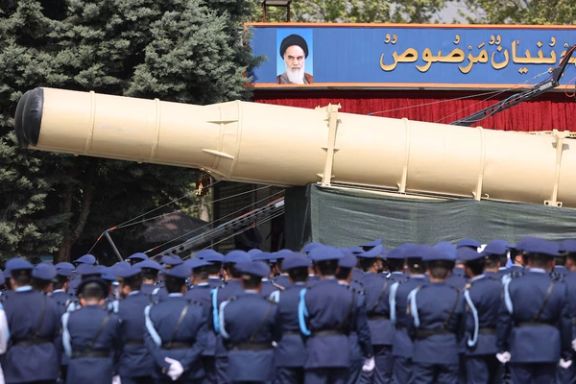
Iran is set to deliver ballistic missiles to Russia "imminently", Bloomberg reported on Monday, amid warnings by Ukraine's allies that the shipment will have serious consequences for the Islamic Republic.
The move, if accurate, could be seen as yet another sign that Russia and Iran are strengthening their strategic partnership on a basis of their shared anti-Western rhetoric.
Russia's access to Iranian ballistic missiles could devastate civilian populations, marking a turning point in the conflict, said Farzin Nadimi, a Senior Fellow with the Washington Institute.
"When I wrote an article about the delivery of Shahed drones to Russia I warned against delivery of ballistic missiles. That it would be the main game changer for the Russians if they take large number of Iranian precision-guided ballistic missiles," said Nadimi, who made the dire warning in August of 2022.
He said some of these missiles will have enough range to hit Western Ukraine and strike important targets like railway stations.
"It's going to have a really bad effect on civilians."
Moscow’s current ballistic missile arsenal reportedly includes Russian and less precise North Korean hardware.
Bloomberg reported that their sources would not give a specific timeline or scope of the transfer, but did state it was 'imminent.' Reuters had reported in February of this year that Iran reportedly sent Russia hundreds of ballistic missiles.
That 'imminent' timing could prove to be useful to Russia, said Nadimi, who believes Moscow wants make gains in Eastern Ukraine in the battle for Donbas before the harsh Eastern European winter approaches.
Iran on Monday neither denied nor confirmed the Bloomberg report. "There is no information about what you said," Iran's Foreign Minister Abbas Araghchi told EU Foreign Policy Chief Josep Borrell when asked about Bloomberg's report, according to a Wall Street Journal report.
Such a deepening partnership could further isolate Iran from the West and worsen an economy already in crisis mode. Ballistic missile transfers to Russia would likely be met with additional sanctions on Iran by Western powers, as promised by Ukraine's western allies. Iran International reached out to the US State Department but did not receive a comment in time for publication.
The G-7 has already imposed several sanctions on Iran and North Korea for supplying Russia with weapons.
Alex Vatanka, the Middle East Institute’s Iran Program director, said the timing of such a deal doesn't add up with recent remarks made by Iran's president Masoud Pezeshkian.
"The timing is puzzling. It comes as Pezeshkian speaks of reducing Iran's international isolation. This sort of missile transfer only hampers Iran's ability to seek possible detente with the Europeans, which is exactly what Pezeshkian and Araghchi have mentioned, and Khamenei indirectly approved," said Vatanka.
Nadimi said the deal was likely a couple of years in the making and wouldn't have likely involved Iran's current president.
Moscow has already received hundreds of Iranian-made drones that have been used in its war against Ukraine after the two anti-Western, "rouge" countries formed a relationship following Russia's invasion of Ukraine in February 2022.
This is a relationship that is based on necessity and benefits, said Gregory Brew, a US analyst with the Eurasia Group on the Eye for Iran podcast.
"Russia's war in Ukraine and Russia's increasing isolation from the international community, the weight of Western sanctions, US support for Ukraine, and Russia's need for weapons, increased arms for its war in Ukraine has offered Iran a way to increase its leverage, get a closer relationship with Moscow largely through by serving as Russia's sort of new source of armaments," said Brew during the podcast episode.
Brew told Iran International that Tehran has been making threating moves since October 2023, when the UN embargo on Iran's missiles/drones' sales expired.
"But if Iran does start sending missiles to Russia, it would not only increase its involvement in that war, but threaten worse relations with the EU, which has signaled it will sanction Iran more heavily in the event it starts selling missiles."
While Iran and Russia have a complicated past, with Moscow once having occupied Iran during the second World War, Iran has to decide whether further deepening itself in the war against Ukraine is part of its long- term goals, and does it serve to benefit.
"Iran has to decide which one is more important: rehabilitation of Iran's badly performing economy, which requires detente with the West; or prioritizing the struggle against the West with likeminded partners like Russia," said Vatanka.
The US Central Command said in a statement that the Saudi-owned Amjad vessel and the Panama-flagged and Greek-operated Blue Lagoon I were hit in an attack but Saudi Arabia later denied the assessment.
However, Saudi’s national shipping company, Bahri, announced on Tuesday that "Amjad was not targeted and sustained no injuries or damage."
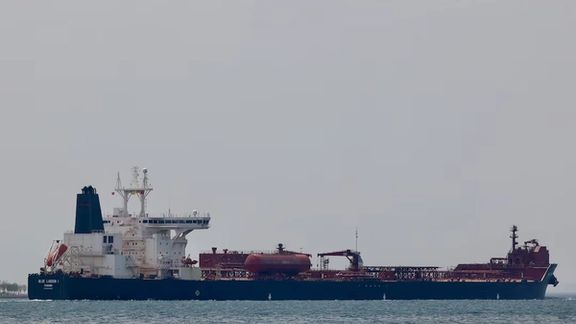
The vessel, which was carrying approximately two million barrels of crude oil, remains seemingly fully operational and is continuing its voyage to its planned destination without interruption.
Bahri emphasized that all relevant authorities were promptly informed, and that the company remains in continuous communication with its crew, closely monitoring the evolving situation.
Iran has vocally supported and praised the Houthis, but rejected claims that it has provided them with arms. The Houthis are a designated terror group by countries including the US and UK.
The US Central Command earlier revealed that the Houthis launched the assault using two ballistic missiles and an unmanned aerial vehicle, striking both vessels, calling the move "reckless acts of terrorism by the Houthis."
Although the Houthis claimed responsibility for targeting the Blue Lagoon with missiles and drones, they made no mention of the Amjad.
The Joint Maritime Information Center, responsible for tracking such incidents, reported that three ballistic missiles hit the Blue Lagoon I tanker 70 nautical miles northwest of the Yemeni port of Saleef.
The center "assesses that Blue Lagoon I was targeted due to other vessels within its company structure making recent port calls in Israel," it said in a report.
"All crew on board are safe. The vessel sustained minimal damage but does not require assistance."
Saudi Arabia, the world’s leading oil exporter, has expressed growing concern over the increased frequency of Houthi attacks on ships in the Red Sea, a maritime corridor for global energy supplies.
The attacks are part of a broader campaign by the Houthis, who have been emboldened by Iran’s support, and have dragged Yemen to become the region's poorest nation after a decade-long war civil war against a Saudi-led coalition.
The recent escalation follows a series of aerial drone and missile strikes by the Houthis, which they claim are in solidarity with Palestinians amid the ongoing conflict in Gaza, in a bid to force Israel into a ceasefire.
The Houthis began targeting maritime commercial traffic in mid-November, following a directive from Iran’s Supreme Leader Ali Khamenei, who urged Muslim nations to impose a blockade on Israel.
Initially concentrated in the Red Sea, these attacks have since spread to other vital waterways, including the Indian Ocean, disrupting international shipping and resulting in the capture of dozens of seafarers.
In response to this growing threat to global trade and freedom of navigation, a US-led coalition of over 20 nations has been formed to counter the blockade. It has seen joint attacks by the UK and US on Houthi infrastructure in Yemen.